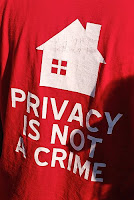
How private is your personal information? This is a question that is becoming more an more important in today's society as technology advances. More people seem willing to put out information about themselves on social networking websites, use online banking, purchase more merchandise, send more emails, and many other activities without giving much thought to the information that they are freely releasing into cyberspace.
Many websites force you to register with there website forcing people to give out information about themselves in order to view content or make purchases on a number of websites. Highly advanced programs are developed to gather personal information to be used in marketing more specific merchandise based on who you are, where you live, previous purchases, personal tastes, but is this right for companies to pry into our personal information for the sake of marketing products to us not to mention people who look to steal your identity. your information can be compromised through scams called phishing.
watch this video that explains phishing
How often have you noticed the advertising on websites you frequently visit targeting your specific location, or the types of products that you have previously purchased? How does an individual protect themselves from personal information being accessed when it is meant to be kept private?
Technology appears to be advancing quickly in the direction of allowing fast and easy access to information. This has many positive benefits many of which have been discussed in my previous post however are we able to have everything available at a click of a button and maintain the desired level of privacy in our personal lives?

I discovered this you tube video explaining how identity thieves are able to even track your every computer key stroke.
With criminals using more advanced technology we should expect that technology would be developed to help protect our rights to privacy.
It amazes me how ignorant many people can be when using social networking sites such as Facebook putting personal information online for the world to see. The Long Tail of Democracy advocates that the internet allows for limitless shelf space for media but this is also true for the individual. With more shelf space for the individual, more awareness should be made of how accessible your information is and how to protect that which is desired to remain private. When was the last time you googled your own name to discover the information that is available through a simple search engine. I know I take the time every now and then to do this to see what pops up. This information is easily available to future employers, relatives, friends, and companies looking to market products to you.
The privacy issue often sparks debates over morality and legality. There seems to be lines that are not clearly drawn when it comes to the Internet privacy and what is morally acceptable and what is legally allowed. The concern is to maintain ideas of freedom, collaboration, idea sharing, and access to everything but without the expense to the individual right to keep some information private. It is a balancing act that is yet to find a its center. Until the time comes I caution everyone who uses the internet to be aware that the world is constantly watching.





